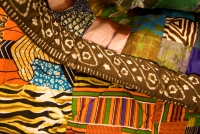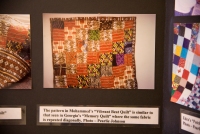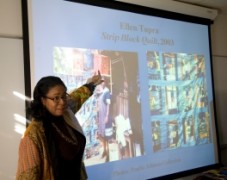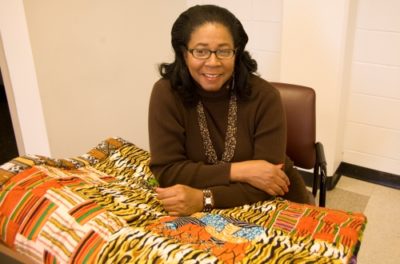Visiting professor uses quilts to weave stories of African American struggles, triumphs
Pearlie Johnson — a visiting assistant professor in the College of Arts and Sciences Black Studies Program — has a passion for African American quilts and the stories surrounding them. As a result of that passion, she has turned quilts into her career.
In her class, Johnson utilizes a section dedicated to African American women’s history to lecture on the significance of the chronicle of quilts. It provides the venue to teach lessons that might otherwise be lost.
Quick Five: Pearlie Johnson, UMKC Black Studies Program
How did this love of quilts begin and where do you get the quilts?
My grandmother introduced me to quilts and quilting when I was younger.

Visiting Professor Pearlie Johnson interweaves the art and craft of quilting to illustrate stories about African American women.
Primarily, the actual quilts shown in the classroom are made by quilters in the Kansas City community, as well as quilts from my private collection. I invite quilters to class to share their knowledge, insight and creative process with the students, bringing two or three quilts as part of their presentation. I find that having the quilts available to students really heightens their learning experience.
With the permission of the artists, I have photographed hundreds of quilts at exhibits. I also scan images from the quilt books that I use as textbooks in my classes. This way, I can teach about quilts not only from the Kansas City area, but quilts and quilters throughout the United States and around the world.
What can your students learn from the quilts?
 Students gain a greater appreciation for art, especially art created from fabric and various fibers. Quilts lend themselves as visual aids, teaching students about women’s history and contemporary issues related to women.
Students gain a greater appreciation for art, especially art created from fabric and various fibers. Quilts lend themselves as visual aids, teaching students about women’s history and contemporary issues related to women.
The quilts also address political issues related to race, class, gender and identity and representation.
One of the goals you have for your students is to introduce them to Afrocentricity. Why is it important?
 Afrocentricity provides an African-centered perspective. That means, in addition to other methodological approaches to inquiry, one also would look to Africa. For example, many African American quilts reinterpret African cultural heritages. In order to understand what these images mean, students learn to search for their original African meaning.
Afrocentricity provides an African-centered perspective. That means, in addition to other methodological approaches to inquiry, one also would look to Africa. For example, many African American quilts reinterpret African cultural heritages. In order to understand what these images mean, students learn to search for their original African meaning.
Secondly, Afrocentricity advocates “Sankofa” – a West African (Akan) proverb meaning “return to your roots and learn from your past to better understand your future.” Through Afrocentricity, students learn not only the challenges that Africans have transcended, but more so, the magnificent contributions that Africa has made to world civilization. Students are empowered through this knowledge and tend to become healthier students as they learn they are not descendants of an inferior race or ancestry.
How does this encourage them to engage in Afrocentricity?
We define it, and we examine it in early and contemporary African American cultural productions. Then, we apply it – where students use this approach in a research project.
How do your classes help strengthen the Black Studies program?
My courses contribute to the Black Studies’ mission, which is to examine the experience and contributions of people of African descent to the formation of American society and culture. For example, the topics we explore – in a general way – are the origins of Black culture, as well as social, political and economic influences. This leads to discussions about the ways in which various elements impact the black experience.

